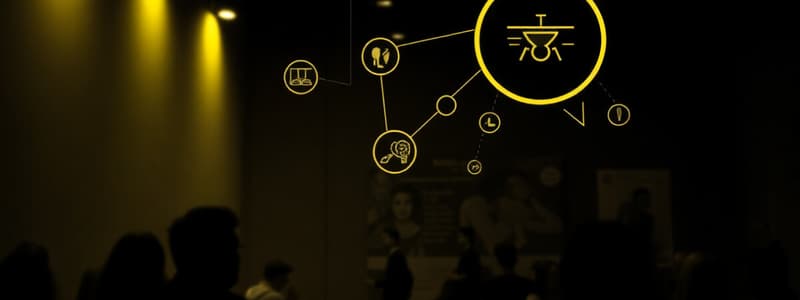Podcast
Questions and Answers
What is the key focus of Conflict Theory in sociology?
What is the key focus of Conflict Theory in sociology?
- Interpersonal relationships among individuals.
- Economic relations and class struggles. (correct)
- Cultural symbols and their meanings.
- The psychological development of individuals.
According to Karl Marx, what role does the proletariat play in society?
According to Karl Marx, what role does the proletariat play in society?
- They sell their labor for minimal compensation. (correct)
- They control the means of production.
- They benefit from the profits of the bourgeoisie.
- They maintain the social status quo.
What concept describes the false belief held by the proletariat about the bourgeoisie?
What concept describes the false belief held by the proletariat about the bourgeoisie?
- Proletarian solidarity.
- Social mobility.
- Class consciousness.
- False class consciousness. (correct)
Which sociologist is known for the Symbolic Interactionism perspective?
Which sociologist is known for the Symbolic Interactionism perspective?
What does the inevitability of revolution, according to Marx, stem from?
What does the inevitability of revolution, according to Marx, stem from?
What does Symbolic Interactionism primarily focus on?
What does Symbolic Interactionism primarily focus on?
What was Marx's perspective on the bourgeoisie's impact on the proletariat?
What was Marx's perspective on the bourgeoisie's impact on the proletariat?
How do sociologists apply qualitative data in the context of Symbolic Interactionism?
How do sociologists apply qualitative data in the context of Symbolic Interactionism?
What is sociology primarily concerned with?
What is sociology primarily concerned with?
Which of the following is NOT one of the main perspectives in sociology?
Which of the following is NOT one of the main perspectives in sociology?
Which sociologist is known for his theory of solidarity?
Which sociologist is known for his theory of solidarity?
What characterizes mechanical solidarity?
What characterizes mechanical solidarity?
Organic solidarity is characteristic of which type of society?
Organic solidarity is characteristic of which type of society?
What do sociologists within the functionalism perspective primarily seek?
What do sociologists within the functionalism perspective primarily seek?
Which of the following is a key feature of symbolic interactionism?
Which of the following is a key feature of symbolic interactionism?
Which sociological theorist is associated with the term 'solidarity' in sociological theory?
Which sociological theorist is associated with the term 'solidarity' in sociological theory?
Flashcards are hidden until you start studying
Study Notes
What is Sociology?
- Sociology is the study of societies, including their development, organization, functioning, and classification.
- Sociology examines the relationships that exist within societies.
Sociological Perspectives
- There are three main perspectives in sociology: functionalism, conflict theory, and symbolic interactionism.
- These perspectives represent the viewpoints of sociologists on societies and their functioning.
Functionalism Perspective
- Functionalism emphasizes the interdependence of all functions in a society and their contribution to maintaining societal stability.
- Key figures in functionalism include:
- Emile Durkheim
- Talcott Parsons
- Robert Merton
- Functionalists often look for consensus and societal stability.
- Solidarity:
- Durkheim argued that all societies have solidarity and consensus, natural forms of cohesion, which manifest in two ways:
- Mechanical Solidarity: Found in simpler, more traditional societies where individuals perform similar tasks (e.g., hunting, building).
- Organic Solidarity: Found in modern, complex societies where individuals specialize in different tasks (e.g., engineer, architect, businessman). Interdependence between these specialties forms a bond.
- Durkheim argued that all societies have solidarity and consensus, natural forms of cohesion, which manifest in two ways:
Conflict Theory
- Conflict theory emphasizes power struggles, inequality, and social change.
- It focuses on the conflict between social classes, particularly the dominance of the upper class (bourgeoisie) over the lower class (proletariat).
- Key figures in conflict theory include:
- Karl Marx, the father of Marxism
- Marx argued that the proletariat (workers) only had their labor to sell, while the bourgeoisie (owners of capital) controlled the means of production and extracted the majority of profits.
- Conflict theory suggests that the proletariat, initially unaware of their exploitation, will eventually awaken to their position and revolt against the bourgeoisie.
Symbolic Interactionism
- Symbolic interactionism focuses on the micro-level, examining the meanings people attach to symbols and events.
- It explores how individuals understand and interpret social interactions.
- This perspective focuses on qualitative data, such as people's responses and perceptions.
- Key figures in symbolic interactionism include:
- George Herbert Mead
- Max Weber
Marxist Perspective
- Marxism, started by Karl Marx, focuses on economic relations that determine social classes and power structures.
- According to Marx, human history can be divided into three periods:
- Primitive Communism: Early societies with little private property and shared resources
- Feudalism: Landowning nobility held power and control over peasants.
- Capitalism: A system where private ownership of capital and free markets dominate.
Studying That Suits You
Use AI to generate personalized quizzes and flashcards to suit your learning preferences.




